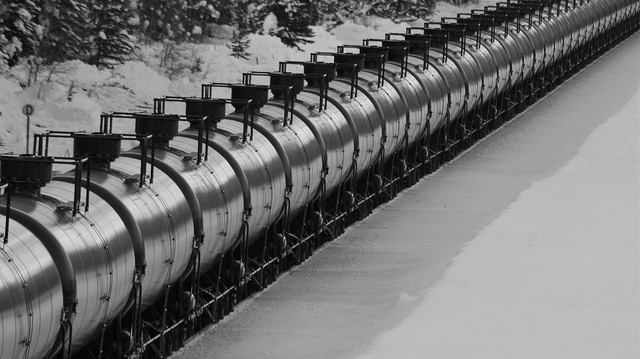Nine days after announcing new regulations designed to improve oil-by-rail safety, the Department of Transportation quietly weakened the rules for testing rail cars and exempted shippers of bitumen from having to meet the new regulations.
The department had been under pressure from industry since announcing new regulations in response to a round of testing on shipments of Bakken crude oil that found companies had classified crudes as less hazardous than they were in 11 of 18 rail cars.
The tanker cars that exploded in Lac-Megantic, Quebec, in July of 2013 were also carrying Bakken crude that was misclassified. The result of these errors is that first responders can arrive at a scene and expect a crude oil fire and instead find a “river of napalm”, as they did in Lac-Megantic.
In a Feb. 25 press release, Department of Transportation Secretary Anthony Foxx said all of the right things:
“Today we are raising the bar for shipping crude oil on behalf of the families and communities along rail lines nationwide —if you intend to move crude oil by rail, then you must test and classify the material appropriately.”
The industry quickly responded with a letter to Foxx letting him know that keeping families and communities safe might require them to shut down oil-by-rail shipping, which would “have an immediate and significant negative economic impact on the nation”.
Apparently this got Foxx’s attention. And the Department of Transportation did the industry’s bidding and relaxed the regulations. This time there was no press release or PR blitz touting the change.
Some details from the amended regulations, dated March 6. How often are companies required to test the Bakken crude in rail cars?
This Amended Order does not specify how often testing should or must be performed, nor does it require testing to be performed for each and every shipment.
What does it specify?
For purposes of this Amended Order, testing must have been conducted within the reasonable, recent past
There is no definition of reasonable and recent past. I guess the lawyers will debate that after the next accident.
But the Department of Transportation wasn’t done just yet. The initial order had tar sands producers quite concerned. According to this article in Hydrocarbon Processing:
Shippers of bitumen, a thick, tarlike substance found in oil sands, were particularly at risk from the Feb. 25 order. They would no longer have been able to export product in older cars known as AAR-211s, companies including Strobel Starostka Transfer Canada said.
Not to worry: the amended rule gives the shipper of bitumen a pass by not classifying it as a flammable crude oil, allowing the substance to be transported in older rail cars.
However, bitumen diluted with condensate may be classified as a flammable oil and fall under the new rules, a spokeswoman for the Pipeline and Hazardous Materials Safety Administration told Hydrocarbon Processing.
So what are the industry’s thoughts on the new amended regulations? The president of the American Fuel & Petrochemical Manufacturers said in a statement that the revisions were a “judicious response.”
According to the same article in Hydrocarbon Processing, tar sands oil (aka bitumen) is currently being shipped out at a rate of 200,000 barrels per day. Peters & Co, an investment bank, is forecasting that will increase to 500,000 barrels per day by the end of this year. With the industry currently being “desperate to get anything to move crude oil” and there being a two- to three-year backlog on orders for new rail cars, being able to move bitumen in older cars is a huge boon to the industry.
We all know there are issues with the current cars being used to transport crude by rail. The majority of cars are prone to rupture if there is an accident. As these cars travel over and along many waterways in the U.S. and Canada, not to mention through the centers of many towns and cities, this is a serious environmental risk.
In a final nod to let the industry self-regulate, the Department of Transportation says testing isn’t required if the companies moving crude oil are familiar with crude oil. If you were a lawyer, how hard would it be to argue that a company with a long history of moving crude oil by rail was “familiar” with moving crude oil by rail? But that is what the new regulations say.
“It says that if the shipper is familiar with the material they’re transporting, then those tests are not necessary,” Rich Moskowitz, general counsel for the American Fuel & Petrochemical Manufacturers, said.
When the train full of Bakken crude crashed and exploded in Casselton, N.D., the fire chief who led the response said, “We had no idea it was this volatile.”
Casselton Mayor Ed McConnell summed up the situation: “So all we can do is hold their feet to the fire and make sure that they’re doing their inspections”
Unfortunately there is no way for communities across the country to make sure “they” are doing their inspections. And unlike the first responders dealing with these incidents, the bureaucrats and politicians in D.C. won’t have their feet anywhere near the next oil-by-rail fire.
Photo: Oil train, Essex MT, by Roy Luck via Flickr
Subscribe to our newsletter
Stay up to date with DeSmog news and alerts







